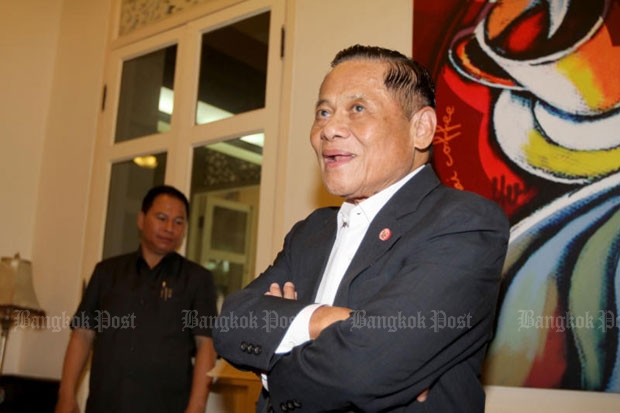
Former prime minister Banharn Silpa-archa died at Siriraj Hospital in Bangkok on Saturday. He was 83.
Banharn died at 4.42am, two days after being admitted to hospital, said Somsak Prisnananthakul, a key Chartthaipattana Party member, confirming a report on traffic radio Jor Sor 100.
The veteran politician had been admitted on Thursday after he had an asthma attack. His condition was critical and he remained in the intensive care unit until he died.
Banharn served as prime minister from 1995-96, a turbulent period preceding the 1997 float of the Thai baht which touched off the Asian financial crisis. An 11-time Suphan Buri MP, in later years he held the title of chief adviser to Chartthaipattana, which was less a political party than a personal fiefdom. The wealth lavished on his home province as a result of his influence led many Thais to refer to it as "Banharnburi".
Banharn was born on Aug 19, 1932 in Suphan Buri to a Chinese merchant family. He dropped out of high school when the Imperial Japanese Army invaded Thailand during World War II. He went to work with his older brother, then founded his own building company.
The construction company became highly successful in the 1960s from work on government infrastructure projects, including military facilities, and Banharn became very wealthy. He also came to learn that while obtaining government construction contracts could be lucrative, being in government and in charge of awarding contracts was also very attractive.
Banharn entered politics in 1976 as an MP for Suphan Buri province. He joined the Chart Pattana Party, at the time dominated by the "Rajakru clan" of Pramarn Adireksarn and Chatichai Choonhavan. He served as a deputy industry minister in the coalition government of Seni Pramoj.
Banharn became known for his ability to use his influence to benefit his home province, where grateful constituents rewarded him with 90% of the vote in successive elections.
In the governments of Gen Prem Tinsulanonda from 1980-88, Banharn held various cabinet positions, including agriculture and transport minister. He also became the Chart Pattana secretary-general in recognition of his role as one of its main financiers and accumulated considerable influence. The media dubbed him "Mr ATM" for his alleged propensity to buy the loyalty of political associates.
After Chart Pattana under Chatchai won the 1988 general election, Banharn was appointed industry minister. In 1990 he became interior minister and then finance minister, shortly before the military coup of 1991 overthrew Chatchai's "buffet government", so named for its egregious corruption.
Banharn spent a rare spell in opposition from 1992-94 when the Democrat Party under Chuan Leekpai formed the government. Banharn became the opposition leader and subsequently broke with Chart Pattana and formed his own party, Chart Thai.
When Chuan's government was toppled by the Phuket land scandal, Chart Thai under Banharn won the election, leading a fractious seven-party coalition. His short-lived administration presided over a bubble economy marked by reckless and untransparent lending that authorities failed to check. The bubble finally burst in 1997 during the term of Banharn's successor, Chavalit Yongchaiyudh, and an economic decline followed.
The political ascent of Thaksin Shinawatra in the early 2000s led to diminished influence for small political parties such as Banharn's. With limited provincial power bases and no real ideology other than wanting to be part of whatever government was in charge, they could not counter the dominance of Thai Rak Thai.
Banharn nonetheless remained active in politics, and in 2008 finally announced that his party would join a coalition with the People Power Party, the successor to the earlier Thaksin-led Thai Rak Thai. The decision broke a vow Banharn had made that he would never join with Thaksin.
Upon the dissolution in 2008 of Chart Thai by the Constitutional Court for electoral fraud, Banharn was banned from politics for five years. Other members founded the Chartthaipattana Party, chaired by Banharn's late brother, Chumpol Silpa-archa. Chartthaipattana served in the Democrat government of Abhisit Vejjajiva, with Chumpol as tourism minister, Banharn's son Warawut as deputy transport minister and daughter Kanchana as deputy education minister.
Banharn is survived by his wife, Khunying Jamsai Silpa-archa, and three children.